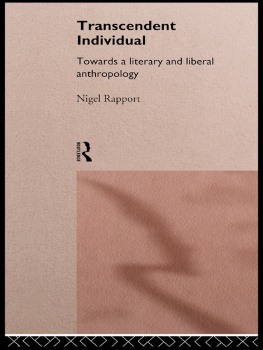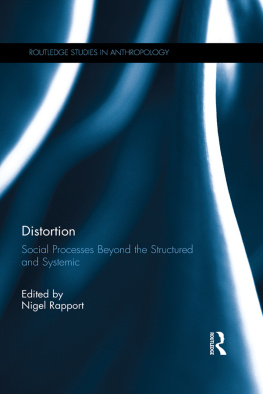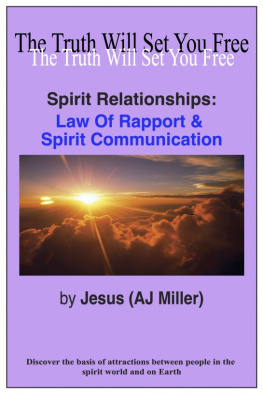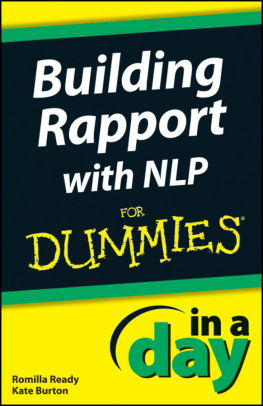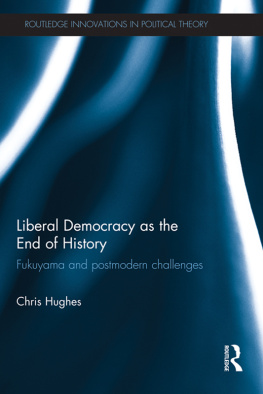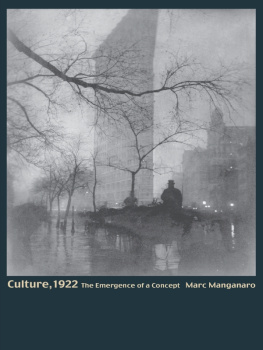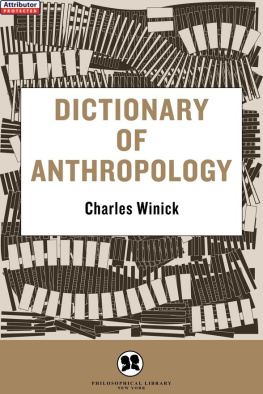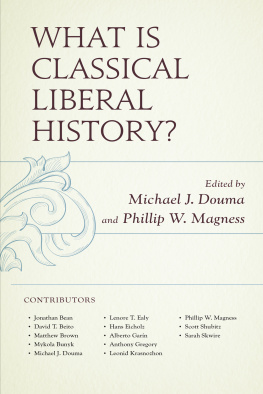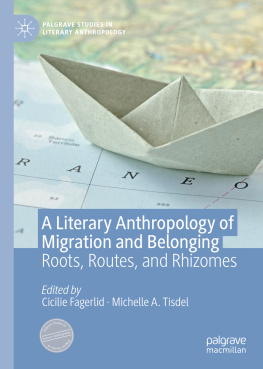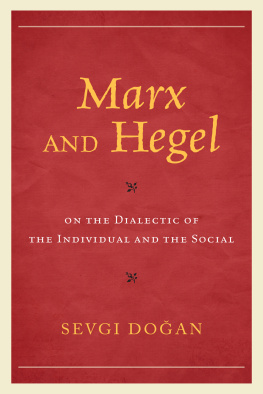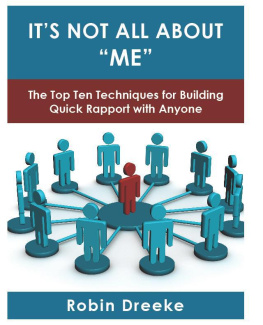Rapport - Transcendent individual : towards a literary and liberal anthropology
Here you can read online Rapport - Transcendent individual : towards a literary and liberal anthropology full text of the book (entire story) in english for free. Download pdf and epub, get meaning, cover and reviews about this ebook. City: London, New York, year: 1997, publisher: Routledge, genre: Religion. Description of the work, (preface) as well as reviews are available. Best literature library LitArk.com created for fans of good reading and offers a wide selection of genres:
Romance novel
Science fiction
Adventure
Detective
Science
History
Home and family
Prose
Art
Politics
Computer
Non-fiction
Religion
Business
Children
Humor
Choose a favorite category and find really read worthwhile books. Enjoy immersion in the world of imagination, feel the emotions of the characters or learn something new for yourself, make an fascinating discovery.
Transcendent individual : towards a literary and liberal anthropology: summary, description and annotation
We offer to read an annotation, description, summary or preface (depends on what the author of the book "Transcendent individual : towards a literary and liberal anthropology" wrote himself). If you haven't found the necessary information about the book — write in the comments, we will try to find it.
Rapport: author's other books
Who wrote Transcendent individual : towards a literary and liberal anthropology? Find out the surname, the name of the author of the book and a list of all author's works by series.
Transcendent individual : towards a literary and liberal anthropology — read online for free the complete book (whole text) full work
Below is the text of the book, divided by pages. System saving the place of the last page read, allows you to conveniently read the book "Transcendent individual : towards a literary and liberal anthropology" online for free, without having to search again every time where you left off. Put a bookmark, and you can go to the page where you finished reading at any time.
Font size:
Interval:
Bookmark:
How might anthropology seem if it were written in celebration of individualityof the individuals conscious and creative engagement with socio-cultural milieuxand if it were committed to a liberal agenda which sought to cherish and defend that individuality?
Transcendent Individual argues for just such a commitment: a reappraisal of the place of the individual in anthropological theorising and ethnographic writing, and a social-scientific appreciation of the individual as methodological, moral, pragmatic and aesthetic subject. Here is an anthropological account of individual creativity, of the narrativity of individual expression, of the originality of individual becoming, and of the morality of the individual body.
Drawing widely on ethnographic and theoretic materials, and bringing into debate a range of voicesNietzsche, Wilde and Forster, Bateson and Gerald Edelman, George Steiner, Richard Rorty and John Berger, Edmund Leach and Anthony Cohenthe book approaches individuality in terms of a range of issues: biological integrity, consciousness, agency, democracy, discourse, knowledge, consumerism, globalism and play.
Written in an accessible style, and juxtaposing literary and philosophical against anthropological voices Transcendent Individual presents its readers with a social-scientific issue of importance and topical concern.
Nigel Rapport is Professor of Anthropological and Philosophical Studies at the University of St Andrews.
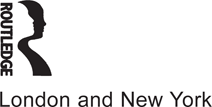
First published 1997
by Routledge
11 New Fetter Lane, London EC4P 4EE
This edition published in the Taylor & Francis e-Library, 2003.
Simultaneously published in the USA and Canada
by Routledge
29 West 35th Street, New York, NY 10001
1997 Nigel Rapport
All rights reserved. No part of this book may be reprinted or reproduced or utilised in any form or by any electronic, mechanical, or other means, now known or hereafter invented, including photocopying and recording, or in any information storage or retrieval system, without permission in writing from the publishers.
British Library Cataloguing in Publication Data
A catalogue record for this book is available from the British Library
Library of Congress Cataloguing in Publication Data
Rapport, Nigel, 1956
Transcendent Individual: towards a literary and liberal anthropology/
Nigel Rapport.
p. cm.
Includes bibliographical references (p. 202) and index.
1. EthnologyPhilosophy. 2. EthnologyAuthorship.
3. Individuality. 4. Ethnology in literature. I. Title.
GN33.R36 1997
305.8001dc21
977414
CIP
ISBN 0-203-44827-8 Master e-book ISBN
ISBN 0-203-75651-7 (Adobe eReader Format)
ISBN 0-415-16966-6 (hbk)
ISBN 0-415-16967-4 (pbk)
What, however, does it mean that we find an insatiable pleasure in making ourselves into our own possibilities, and cannotin spite of knowing what it iscease to play the game of our potentials? It is to questions of this kind that literary anthropology has to address itself.
Wolfgang Iser
Towards a Literary Anthropology
To Elizabeth and Callum
In the preparation of these essays, a number of individuals were kind enough to act variously as mentors, interlocutors, critics and confidants. Above all, I benefited from the generous commentary of Vered Amit-Talai, Eduardo Archetti, Aleksander Boskovik, Anthony Cohen, Peter Collins, Andrew Dawson, Roy Dilley, Jeanette Edwards, Anna Grimshaw, Claudia Gross, Ladislav Holy, Allison James, Tamara Kohn, Joanna Overing, David Riches, Anne Rowbottom, Jonathan Skinner, Marilyn Strathern and Deborah Wickering.
Three of the essays appeared in earlier incarnations in Anthropology Today, and I owe Jonathan Benthall, the journals editor, a great deal for the invitations to contribute, as well as for his patience with my efforts.
At Routledge, Heather Gibson has remained a most supportive editor and a stimulating fellow-traveller in the enterprise of literary anthropology.
Finally, I do not forget the supportand all elseof Elizabeth Munro, to whom (along with Callum) the volume is dedicated with love.
NJR
St Andrews 1997
Towards a liberal and literary appreciation of the conscious and creative individual
This is a book of essays all of which bear on the theme of individualityon the individuals conscious and creative engagement with certain socio-cultural environmentsand the links between individuality and the writing of social science. The essays have an iconoclastic agenda: the writing of social science (in particular socio-cultural anthropology) as imbued with a belief in the transcendent subject. Here is a book of essays intent on a social-scientific appreciation of the individual who makes himself or herself ex nihilo and in an originary fashionwho comes to be, who achieves a consciousness, outwith and beyond the socio-cultural environment in which he or she was born and has been socialised/ enculturated.
A number of keywords might be stated, for later elaboration: Individual, Individuality, Creativity, Consciousness, Writing, Narrative, Discourse, Form, Meaning, Interpretation, Personalisation, Anthropology, Literature.
The individual agenda of these essays is methodological, ontological, aesthetic and moral.
To paraphrase Oscar Wilde, only by intensifying ones own individuality, through precise consciousness of oneself in a sociocultural environment, can one hope to appreciate the individuality of others and thereby approach an understanding: one must look inward in order to see outward; by looking outward one realises ones inwardness. Here is a necessary and continuous dualism. Far from a narrowly introspective or overly idealistic exercise, then, it is the case that how we conceptually understand ourselves and our lives-in-society, how we validate our claims to self-knowledge, and how we transpose such knowledge into narrative, are all entirely crucial to our project of apprehending otherness, and, indeed, indistinguishable from it (cf. Stanley 1993:50; also Cohen 1994:136). In Wildes words, personality is an element of revelation (1913:156; and cf. Chesterton 1936:170).
Moreover, such an approach is not only methodologically potent but ontologically necessary. For it is in individuality that the roots of the social and cultural lie. Except for the conscious individual, there is no social mover: no possibility of social process or organisation, of structured relations, routinised interactions or institutionalised behaviours. And except for the creative individual, there is no cultural dynamo: no possibility of cultural symbols or norms, of interpretive regimes, classificatory systems or forms of life. In short, to return to Wilde (1913:123), there can be no unity without individuals: no commonality without diversity, no socio-cultural sharing or coming together without individual discreteness (cf. Rapport 1993:169ff.).
For Wilde, again, this makes the individual a source of wonder, a thing of beauty. I find so too, and I celebrate such individuality in these essays. I try to bring to social-scientific account an aesthetic appreciation of the work of the individual in creating the forms of life by which societies operate and in construing the meanings by which cultural symbols are animated.
Finally, this imbues the essays with a moral quest. Here is an attempt to write a liberal social science which feels free to champion the individual and feels constrained to criticise that happenstance and circumstance where individuality is threatened or denied. Here, too, is a defence of liberal theorising in the face of conventional social-scientific depreciation which contends that this theorising does little more than articulate the prejudices of a politically naive Anglo-American intellectual class, and that such theorising is anyway impotent in an age dominated by global communitarianismby resurgent ethnicities, renascent localisms, typifying bureaucracies and militant fundamentalisms.
Font size:
Interval:
Bookmark:
Similar books «Transcendent individual : towards a literary and liberal anthropology»
Look at similar books to Transcendent individual : towards a literary and liberal anthropology. We have selected literature similar in name and meaning in the hope of providing readers with more options to find new, interesting, not yet read works.
Discussion, reviews of the book Transcendent individual : towards a literary and liberal anthropology and just readers' own opinions. Leave your comments, write what you think about the work, its meaning or the main characters. Specify what exactly you liked and what you didn't like, and why you think so.

